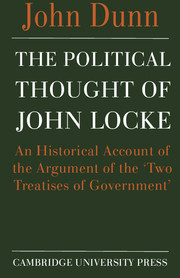 The Political Thought of John Locke
The Political Thought of John Locke Book contents
- Frontmatter
- Contents
- Preface
- AUTHOR'S NOTE
- Dedication
- PART I
- PART II
- PART III
- 8 The Premises of the Argument
- 9 The State of Nature
- 10 The Creation of the Legitimate Polity
- 11 Prerogative
- 12 Public Good and Reason of State
- 13 The Conditions for Legitimate Resistance
- 14 The Law of Nature
- PART IV
- PART V
- Bibliography
- Index
- Frontmatter
- Contents
- Preface
- AUTHOR'S NOTE
- Dedication
- PART I
- PART II
- PART III
- 8 The Premises of the Argument
- 9 The State of Nature
- 10 The Creation of the Legitimate Polity
- 11 Prerogative
- 12 Public Good and Reason of State
- 13 The Conditions for Legitimate Resistance
- 14 The Law of Nature
- PART IV
- PART V
- Bibliography
- Index
Summary
Two sorts of legitimacy can be predicated of political authority. The first (and for the purposes of Locke's dispute with Filmer the paradigmatic) is that which attaches to the prescriptions of a consensually based legislative. The laws of a morally acceptable polity have a right to demand the obedience of the occupants of the territory of that polity. But this is to state merely the jural relationship, not to describe the actual human situation. Positive laws, just as much as the law of nature itself, can only become operational in the world through the acts of executors. Jurally the acts of such men are judicial as well as executive. They constitute decisions as to what action a general rule prescribes in a particular instance. The private judicial decisions of individuals are simply ordinary moral life, in so far as this is not immediately affected by positive law. The public judicial decisions of a legitimate political authority are simply enforcements of positive law by an executive, a judiciary or even a legislative. The authority of a legislative sovereign derives from the consent of its subjects, a complicated legal fiction, though one which purports to have a determinate sociological component. He executes what are, jurally speaking, their rights to execute the law of nature, to decide the applications of its prescriptions and to enforce these.
- Type
- Chapter
- Information
- The Political Thought of John LockeAn Historical Account of the Argument of the 'Two Treatises of Government', pp. 148 - 156Publisher: Cambridge University PressPrint publication year: 1969


